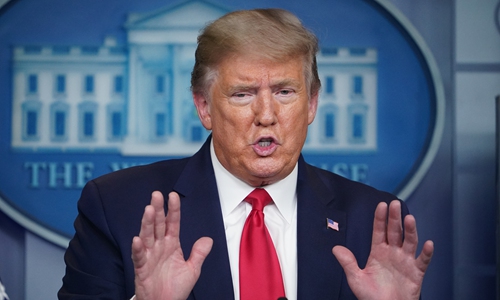White House, US media wrangling costing lives
By Wei Nanzhi Source:Global Times Published: 2020/4/16 14:52:05

US President Donald Trump speaks during the daily briefing on the novel coronavirus at the White House on Monday, in Washington, DC. Photo: AFP
CBS reporter Paula Reid ripped into US President Donald Trump at the White House coronavirus briefing on Monday. Then when it came to what authority Trump had to unilaterally order the country to restart economy, many journalists expressed doubts about the president in public. This press briefing highlighted the antipathy between the White House and mainstream US media that have been further exasperated by the epidemic that continues to ravage the US.
The first factor that triggered arguments between the White House and US media is their different target groups. They barely share any willingness to jointly fight the overwhelming public health challenges brought by COVID-19. The White House coronavirus briefings have become free propaganda shows for Trump's presidential campaign. The White House attacks the media to gain support from conservatives living outside the metropolitan areas, and to pander to anti-intellectualism and hostility toward elites.
The Trump administration seems to be in a constant search for others it can hold accountability rather than implementing epidemic control measures. The White House has politicized COVID-19, and passed the buck, suggesting China and the World Health Organization are responsible for the pandemic. Trump has also laid blame on Democrats and the US Centers for Disease Control and Prevention. The White House frequently accuses the US media of reporting fake news and propagandizing for China. Meanwhile, the media continues to report from various perspectives with the mainstream media focusing on White House's failure in fighting the coronavirus.
Now the most urgent task for the US is to provide public health resources to federal, state and local governments. Social groups and enterprises also need assistance so they can help the elderly, the poor and those in ill health, who are most severely affected by the epidemic. Data on the coronavirus in the US shows black people and Latinos are disproportionately suffering coronavirus infections and are being infected at much higher rates than whites.
A study by the Federal Reserve shows 40 percent of Americans don't have a contingency fund that could cover an unexpected expense of $400. COVID-19 patients who are poor and even some middle-class Americans, are unable to pay for their treatment. Acting efficiently and saving lives are basic humanitarian requirements, which, to some extent, are selectively ignored by the White House and US media.
November's US presidential election has triggered an upsurge in partisan wrangling between the two parties and within the parties. The US has missed the best time for COVID-19 prevention and control due to the two parties' efforts to politicize the virus. The US is a federal country where public health affairs are mainly managed by state and local governments, but the federal government has the authority to provide financial aid and allocate medical reserves. Many disputes have arisen between the White House and state governments that are led by the Democratic Party.
Under the context of the above-mentioned power struggle, it is difficult for professionals to give full play to their expertise to guide core anti-epidemic decision-making. Aletha Maybank, chief health equity officer of the American Medical Association, said that the association has not yet received accurate data on infected people in the US, especially "on the race and ethnic patterns of the pandemic."
Some media took the epidemic outbreak as an opportunity to criticize the White House, but they failed to thoroughly think over how to overcome the structural political tension within the US, nor how to mobilize as many social resources as possible to effectively fight the novel coronavirus.
It should be noted that the rise in Trump's popularity rating is short term and a normal during crises in the US. Historically, every time the US encounters a major crisis, the president's approval rating will ascend to a certain extent. So it is normal that Trump's support once reached the highest since he took office. However, if the epidemic continues to run out of control, his reelection will be subjected to a negative impact.
The real claim behind all disputes between the White House and US media that exacerbates political polarization in the US is all about election. And this will continue to tear US society apart.
The author is a research fellow with the Institute of American Studies, Chinese Academy of Social Sciences. opinion@globaltimes.com.cn
RELATED ARTICLES:
Posted in: VIEWPOINT